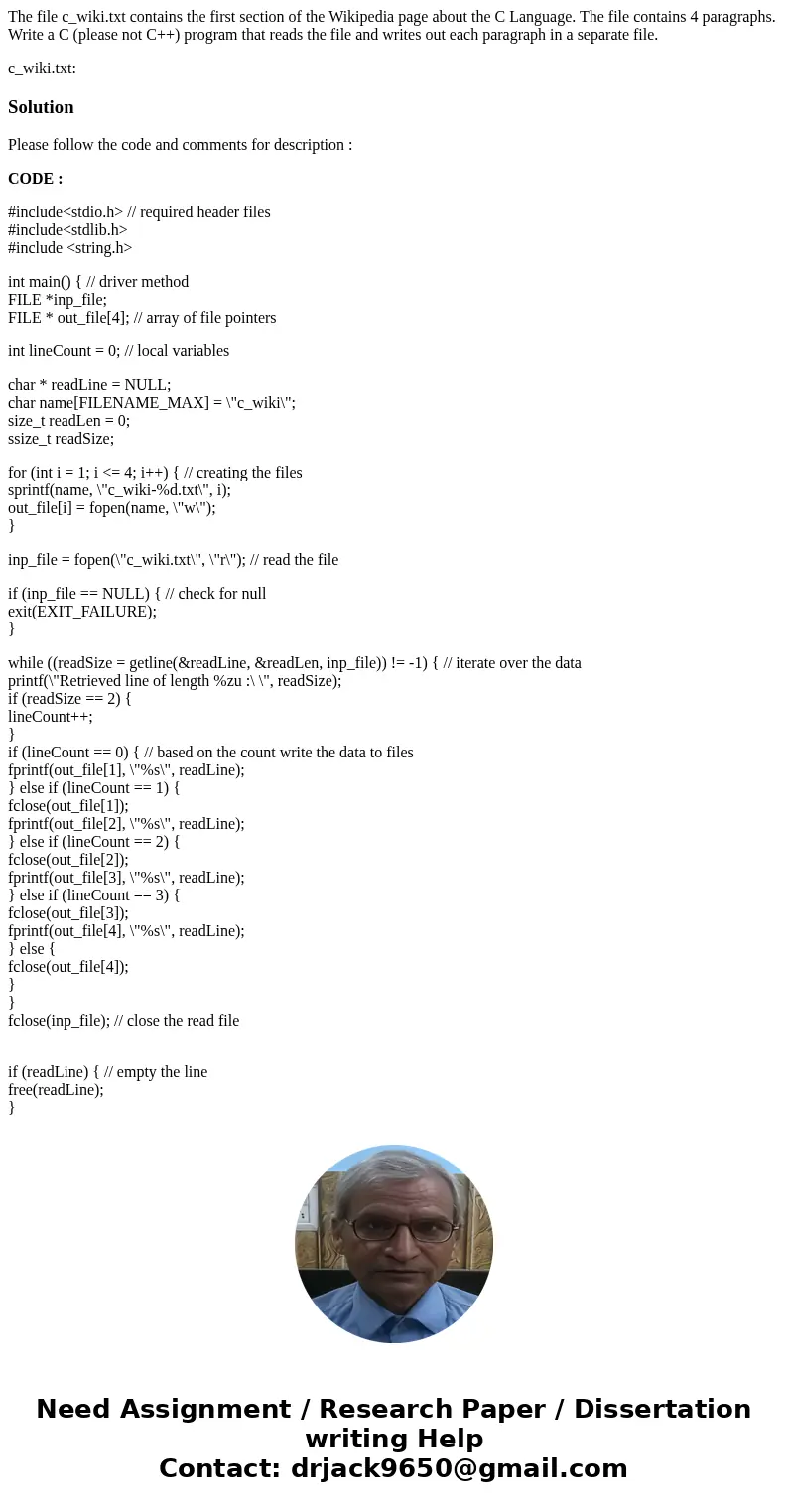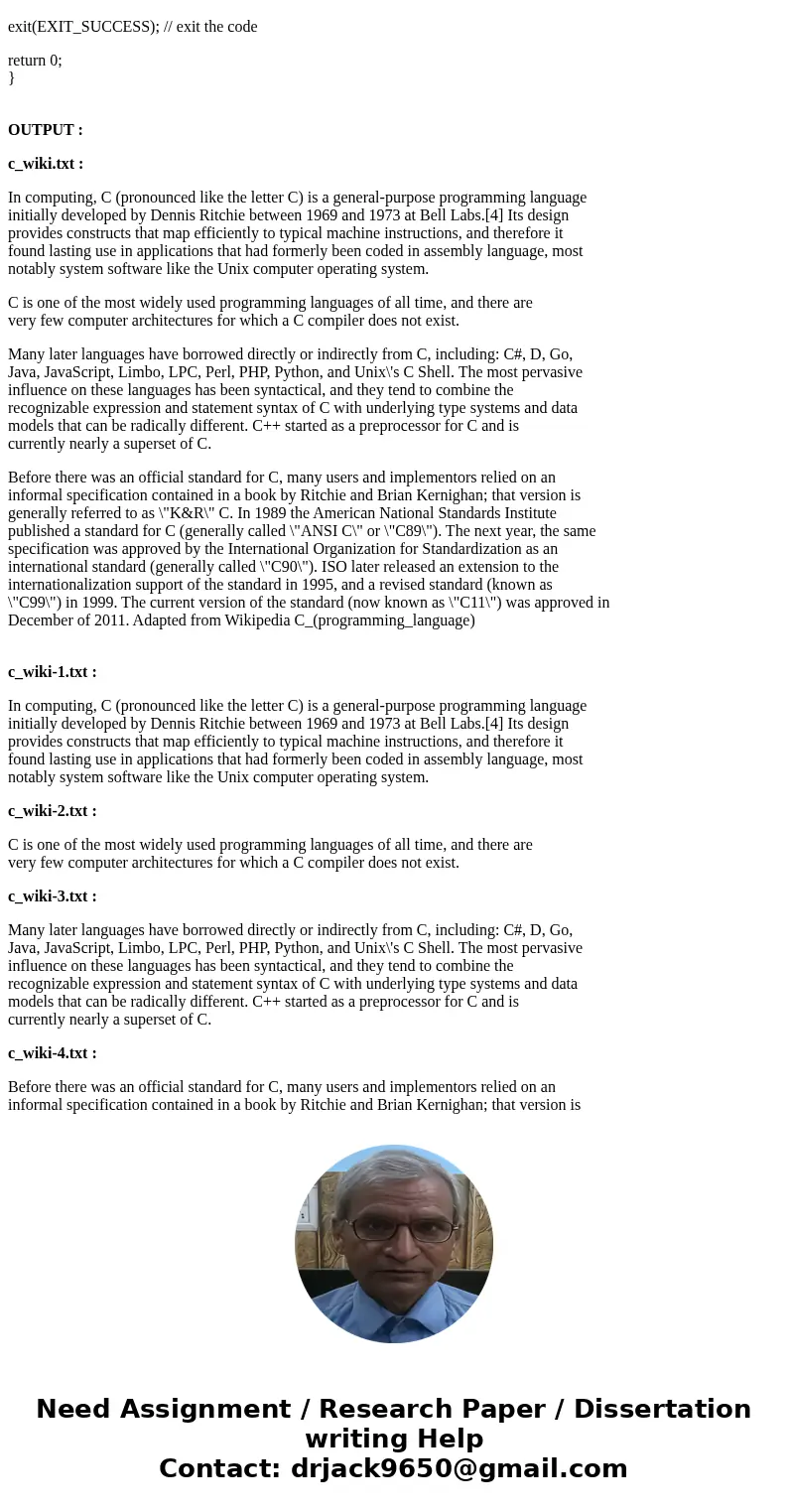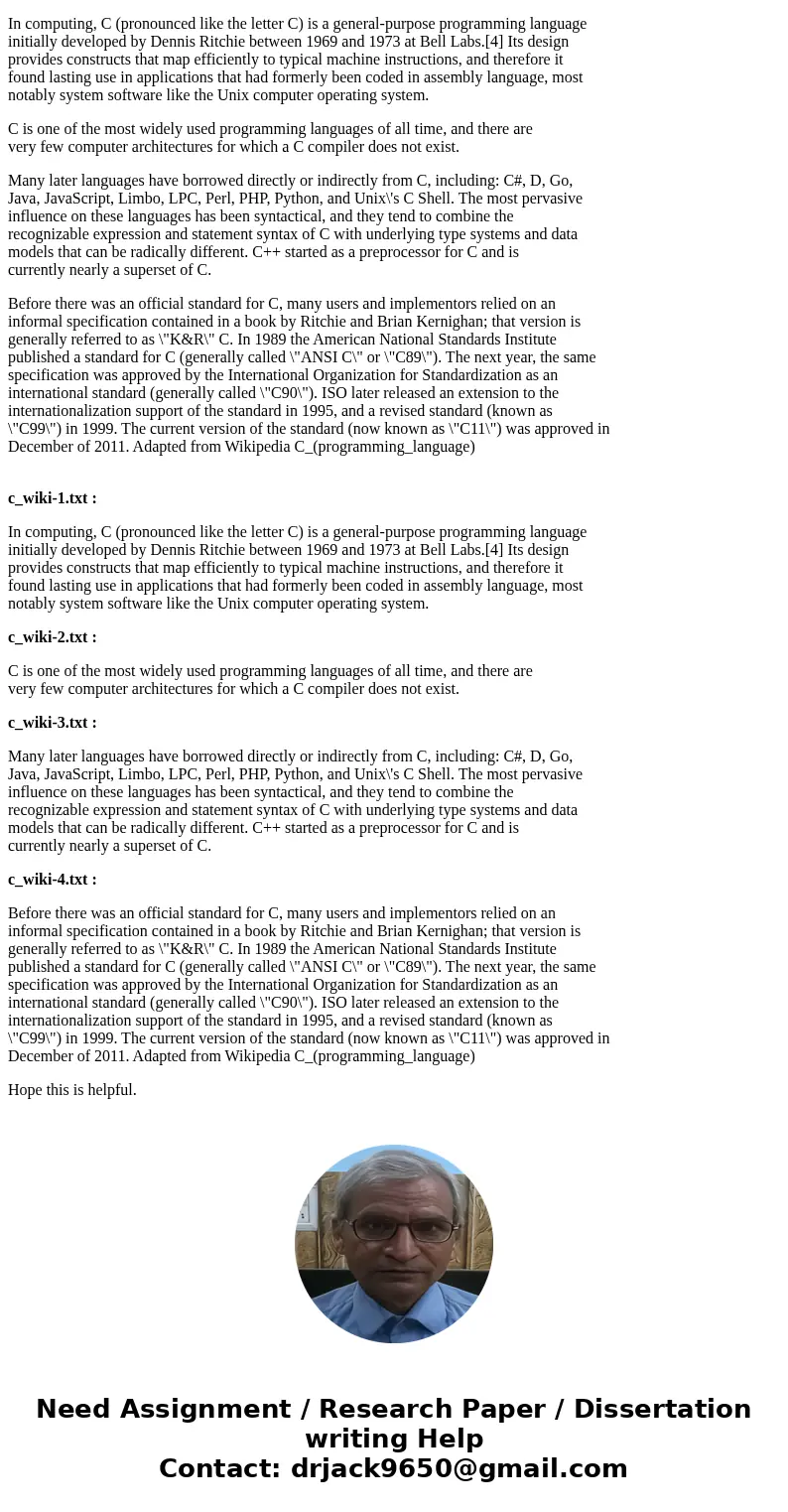The file cwikitxt contains the first section of the Wikipedi
The file c_wiki.txt contains the first section of the Wikipedia page about the C Language. The file contains 4 paragraphs. Write a C (please not C++) program that reads the file and writes out each paragraph in a separate file.
c_wiki.txt:
Solution
Please follow the code and comments for description :
CODE :
#include<stdio.h> // required header files
#include<stdlib.h>
#include <string.h>
int main() { // driver method
FILE *inp_file;
FILE * out_file[4]; // array of file pointers
int lineCount = 0; // local variables
char * readLine = NULL;
char name[FILENAME_MAX] = \"c_wiki\";
size_t readLen = 0;
ssize_t readSize;
for (int i = 1; i <= 4; i++) { // creating the files
sprintf(name, \"c_wiki-%d.txt\", i);
out_file[i] = fopen(name, \"w\");
}
inp_file = fopen(\"c_wiki.txt\", \"r\"); // read the file
if (inp_file == NULL) { // check for null
exit(EXIT_FAILURE);
}
while ((readSize = getline(&readLine, &readLen, inp_file)) != -1) { // iterate over the data
printf(\"Retrieved line of length %zu :\ \", readSize);
if (readSize == 2) {
lineCount++;
}
if (lineCount == 0) { // based on the count write the data to files
fprintf(out_file[1], \"%s\", readLine);
} else if (lineCount == 1) {
fclose(out_file[1]);
fprintf(out_file[2], \"%s\", readLine);
} else if (lineCount == 2) {
fclose(out_file[2]);
fprintf(out_file[3], \"%s\", readLine);
} else if (lineCount == 3) {
fclose(out_file[3]);
fprintf(out_file[4], \"%s\", readLine);
} else {
fclose(out_file[4]);
}
}
fclose(inp_file); // close the read file
if (readLine) { // empty the line
free(readLine);
}
exit(EXIT_SUCCESS); // exit the code
return 0;
}
OUTPUT :
c_wiki.txt :
In computing, C (pronounced like the letter C) is a general-purpose programming language
initially developed by Dennis Ritchie between 1969 and 1973 at Bell Labs.[4] Its design
provides constructs that map efficiently to typical machine instructions, and therefore it
found lasting use in applications that had formerly been coded in assembly language, most
notably system software like the Unix computer operating system.
C is one of the most widely used programming languages of all time, and there are
very few computer architectures for which a C compiler does not exist.
Many later languages have borrowed directly or indirectly from C, including: C#, D, Go,
Java, JavaScript, Limbo, LPC, Perl, PHP, Python, and Unix\'s C Shell. The most pervasive
influence on these languages has been syntactical, and they tend to combine the
recognizable expression and statement syntax of C with underlying type systems and data
models that can be radically different. C++ started as a preprocessor for C and is
currently nearly a superset of C.
Before there was an official standard for C, many users and implementors relied on an
informal specification contained in a book by Ritchie and Brian Kernighan; that version is
generally referred to as \"K&R\" C. In 1989 the American National Standards Institute
published a standard for C (generally called \"ANSI C\" or \"C89\"). The next year, the same
specification was approved by the International Organization for Standardization as an
international standard (generally called \"C90\"). ISO later released an extension to the
internationalization support of the standard in 1995, and a revised standard (known as
\"C99\") in 1999. The current version of the standard (now known as \"C11\") was approved in
December of 2011. Adapted from Wikipedia C_(programming_language)
c_wiki-1.txt :
In computing, C (pronounced like the letter C) is a general-purpose programming language
initially developed by Dennis Ritchie between 1969 and 1973 at Bell Labs.[4] Its design
provides constructs that map efficiently to typical machine instructions, and therefore it
found lasting use in applications that had formerly been coded in assembly language, most
notably system software like the Unix computer operating system.
c_wiki-2.txt :
C is one of the most widely used programming languages of all time, and there are
very few computer architectures for which a C compiler does not exist.
c_wiki-3.txt :
Many later languages have borrowed directly or indirectly from C, including: C#, D, Go,
Java, JavaScript, Limbo, LPC, Perl, PHP, Python, and Unix\'s C Shell. The most pervasive
influence on these languages has been syntactical, and they tend to combine the
recognizable expression and statement syntax of C with underlying type systems and data
models that can be radically different. C++ started as a preprocessor for C and is
currently nearly a superset of C.
c_wiki-4.txt :
Before there was an official standard for C, many users and implementors relied on an
informal specification contained in a book by Ritchie and Brian Kernighan; that version is
generally referred to as \"K&R\" C. In 1989 the American National Standards Institute
published a standard for C (generally called \"ANSI C\" or \"C89\"). The next year, the same
specification was approved by the International Organization for Standardization as an
international standard (generally called \"C90\"). ISO later released an extension to the
internationalization support of the standard in 1995, and a revised standard (known as
\"C99\") in 1999. The current version of the standard (now known as \"C11\") was approved in
December of 2011. Adapted from Wikipedia C_(programming_language)
Hope this is helpful.



 Homework Sourse
Homework Sourse